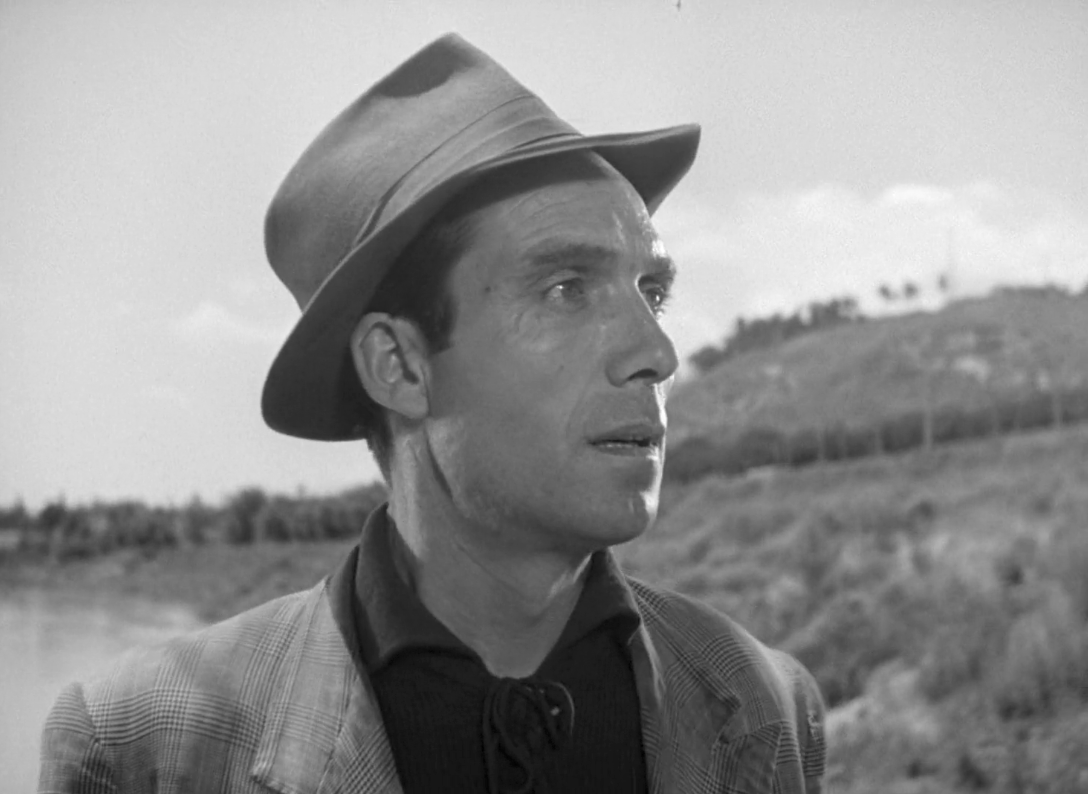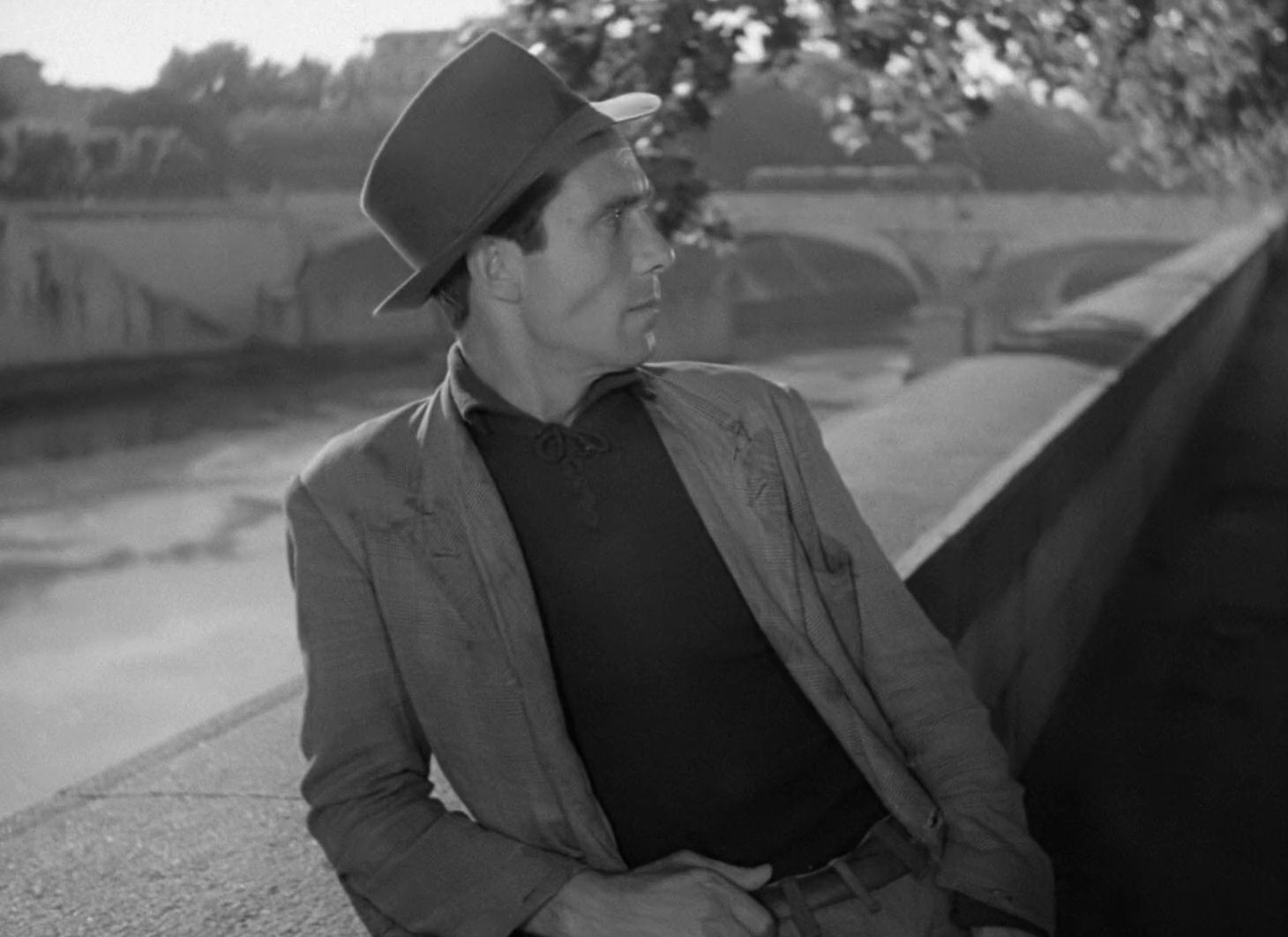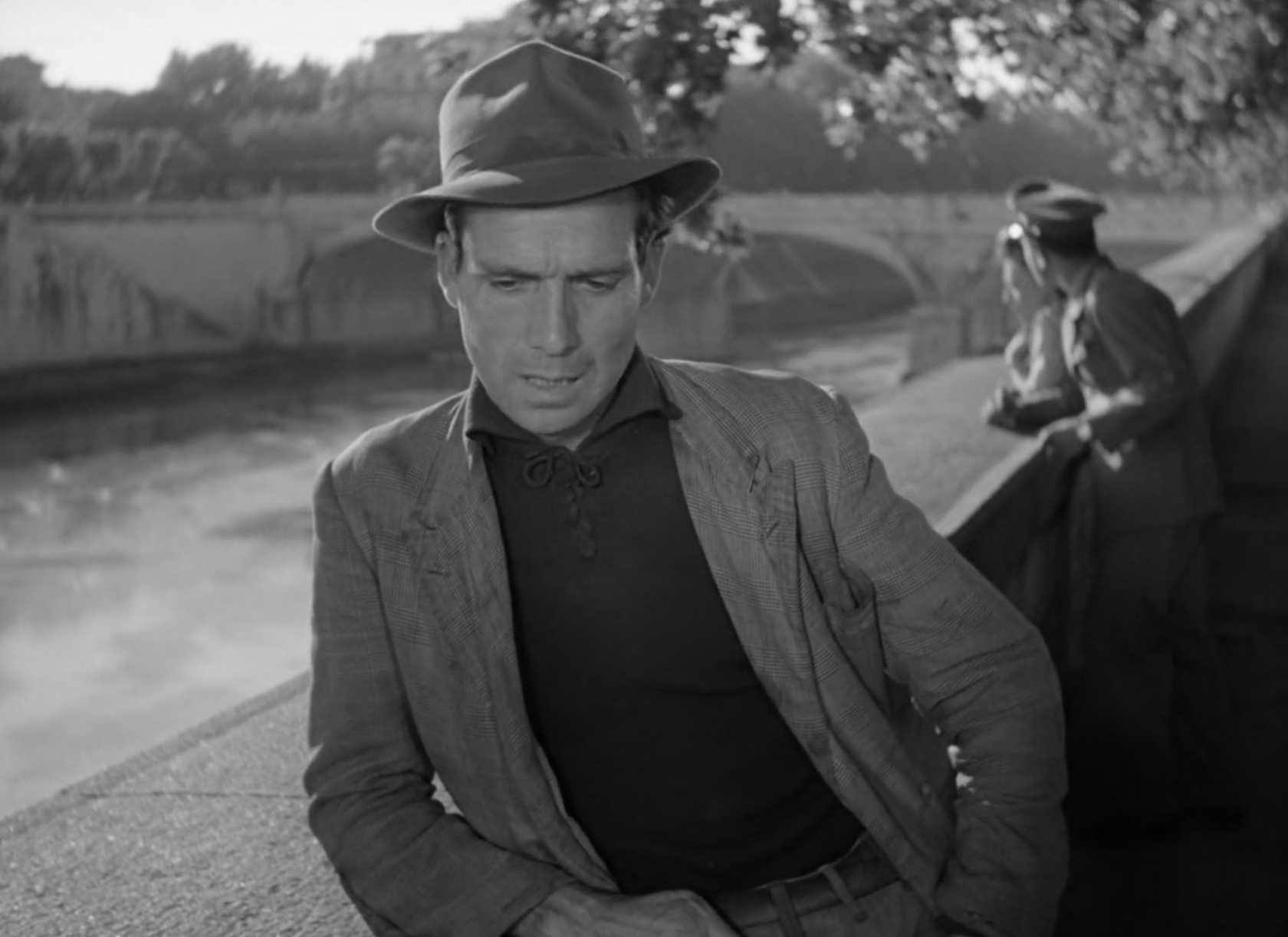Regia / Director: Vittorio De Sica, 1948
"Aspettami vicino al ponte" – dice Antonio – "Vado a cercare quel vecchio". Poi corre via.
“Wait for me by the bridge.” Antonio says. “I’m going to look for that old man.” Then he runs off.
Antonio corre freneticamente attraverso un paesaggio tranquillo: un fiume fermo, alberi frondosi.
Antonio races frantically through a peaceful landscape: a still river, leafy trees.
Rimasto solo, Bruno è una piccola figura accanto a un pilastro monumentale del Ponte Duca d'Aosta, eretto da Mussolini. Questa lastra incombente, con la sua scultura in rilievo di uomini in guerra, è un raro richiamo storico in un film focalizzato sulle vite e sui posti quotidiani dei poveri nell'Italia del dopoguerra.
Left alone, Bruno is a small figure next to a monumental pillar of the Duca d’Aosta Bridge, erected by Mussolini. This looming slab, with its relief sculpture of men at war, is a rare historical reminder in a film focused on the everyday lives and places of the poor in postwar Italy.
Con la giacca piena di buchi e le lacrime agli occhi, Bruno guarda il padre correre lungo la riva del fiume.
Jacket full of holes, tears in his eyes, Bruno watches his father run along the riverbank.
Antonio si ferma e scruta il paesaggio desolato, come se l’anziano potesse nascondersi lì.
Antonio stops and scans the desolate landscape, as if the old man might be hiding there.
Da fuori campo, un coro di voci chiama: "Aiuto! Un ragazzo sta annegando!" Antonio si volta a guardare, poi torna ai suoi problemi. Ma si guarda di nuovo indietro.
From off-screen, a chorus of voices calls, “Help! A boy is drowning!” Antonio turns and looks over, then returns to his own problems. But he looks back again.
All'inizio si arrampica lentamente, poi prende velocità. E se fosse Bruno ad annegare?
Climbing up slowly at first, he gathers speed. What if it was Bruno who’s drowning?
Antonio si affretta verso il frastuono della folla davanti a lui. "Bruno!" – grida – "Bruno!"
Sullo sfondo si intravedono le grandi strutture residenziali del presunto miracolo italiano del dopoguerra.
Antonio hurries toward the hubbub of the crowd ahead of him. “Bruno!” he yells. “Bruno!”
In the background, we glimpse the big residential structures of Italy’s supposed post-war miracle.
Corre nell'oscurità sotto un ponte ad arco. Davanti a lui, altri si precipitano verso la scena.
Le grida di Antonio per Bruno, che risuonano sotto l’arco, sembrano sovrastare tutto il resto, persino il clamore della folla.
He runs into the darkness under an arched bridge. Ahead of him, others are rushing towards the scene.
Antonio’s shouts for Bruno, echoing under the arch, seem to drown out everything else, even the clamor of the crowd.
Soldati in uniforme scendono verso l'acqua, dove, insieme a donne in abito estivo, ragazzi in costume da bagno e sconosciuti urlanti, osservano una barca nell'acqua.
Uniformed soldiers run down toward the water, where, with women in summer dresses, boys in swimsuits, and shouting strangers, they watch a boat out in the water.
Uscito dall'arco scuro, Antonio sta in piedi, sudato, in cima alla riva del fiume e guarda il ragazzo che viene tirato sulla barca.
Emerging from the dark arch, Antonio stands, sweating, at the top of the riverbank and looks on as the boy is pulled into the boat.
Tira un sospiro di sollievo: il ragazzo è più grande di Bruno e indossa un costume da bagno. Non è un problema di Antonio.
He breathes a sigh of relief: the boy is older than Bruno and is wearing a swimsuit. It’s not Antonio’s problem.
Dalla riva del fiume, Antonio guarda verso il ponte e vede suo figlio che lo aspetta, proprio come gli era stato detto di fare.
Un passante chiama rivolto verso il basso dal ponte: "Si è fatto male?"
"No, sta bene".
From the riverside, Antonio looks over to the bridge, and he sees his son waiting for him, just as he was told to do.
A bystander calls down from the bridge, “Is he hurt?”
“No, he’s okay.”
Le campane della chiesa stanno suonando. Sul gradino più alto, Bruno si toglie la giacca e si siede. Visto dal basso, è in posa contro le nuvole, incorniciato dalle orizzontali dell'inquadratura, le linee elettriche accoppiate. È un promemoria per Antonio di ciò che è più importante nella vita.
Church bells are ringing out. At the top of the staircase, Bruno takes off his jacket and sits. Seen from below, he’s posed against clouds, framed by the horizontals in the shot, the paired power lines. He’s a reminder to Antonio of what is most important in life.
Antonio gli corre incontro, facendo due gradini alla volta.
Antonio runs up to him, taking the steps two at a time.
Ma Bruno si alza e si allontana.
"Bru', mettiti la giacchetta che sei sudato! Mettila!" Allunga la mano per aiutarlo, ma Bruno la allontana e si infila la giacca da solo.
But Bruno gets up and walks away.
“Bru’, you’re sweating, put on your jacket! Put it on!” He reaches out to help, but Bruno pushes his hand away and puts on the jacket himself.
I violini suonano malinconicamente mentre camminano lungo il fiume. Antonio chiede: "Sei stanco?" Bruno annuisce e abbassa lo sguardo.
Melancholy violins play as they walk alongside the river. Antonio asks, “Are you tired?” Bruno nods and looks down.
"Mettiti a sedere. Tanto, che vuoi fare? Adesso andiamo a casa". Antonio fa un gesto verso un gruppo di lastre di pietra appoggiate al muro del fiume. "Siediti!"
“Sit down a minute. Anyway, what can we do? Now we’ll go home.” Antonio gestures toward a group of stone slabs resting against the riverside wall. “Sit down!”
Bruno si siede su una lastra orizzontale e Antonio si appoggia al muro. Un camion di passaggio trasporta dei tifosi di calcio esultanti – soldati italiani, probabilmente modenesi trasferiti lontano da casa. Uno di loro tiene in mano un cartello che dice: "Forza Modena!"
Bruno sits on a horizontal slab, and Antonio leans against the wall. A passing truck carries cheering soccer fans – Italian soldiers, probably Modeneses stationed far from home. One of them holds a sign that says, “Go, Modena!”
Vedendo il cartello, Antonio chiede: "È una buona squadra il Modena?" Bruno, senza espressione, scuote la testa.
Seeing the sign, Antonio asks, “Is Modena a good team?” Bruno, expressionless, shakes his head.
"Hai fame?" Bruno alza lo sguardo speranzoso e annuisce leggermente con la testa. Poi abbassa lo sguardo, ancora ferito e arrabbiato.
“Are you hungry?” Bruno looks up hopefully and nods his head slightly. Then he looks down, still hurt and angry.
Antonio tira fuori il portafoglio e conta le banconote in silenzio, mentre il figlio lo guarda.
Antonio takes out his wallet and counts the bills silently, as his son watches.
"Te la mangeresti una pizza?"
Bruno finalmente sorride, alzando lo sguardo verso il padre con apprezzamento. Il muro a cui si appoggia taglia in diagonale l'inquadratura. Sullo sfondo, la città è una presenza spettrale.
Bruno annuisce, quasi impercettibilmente.
“Would you eat a pizza?”
Bruno finally smiles, looking up at his father with appreciation. The wall he leans against cuts a diagonal through the frame. In the far background, the city is a ghostly presence.
Bruno nods, almost imperceptibly.
Con aria cupa, Antonio dice: "Andiamo, va’. Chi ce lo fa fare di stare qui a tribolare?"
Bruno si lancia la sciarpa sulle spalle e i due partono. Domani, chi lo sa? Per ora vanno a mangiare.
Looking grim, Antonio says, “Let’s go, come on. Who’s making us stay here and struggle?”
Bruno throws his scarf over his shoulder and the two set off. Tomorrow, who knows? For now, they go eat.
FINE PARTE 17
Ecco the link to Parte 18 of this cineracconto! Subscribe to receive a weekly email newsletter with links to all our new posts.


























































